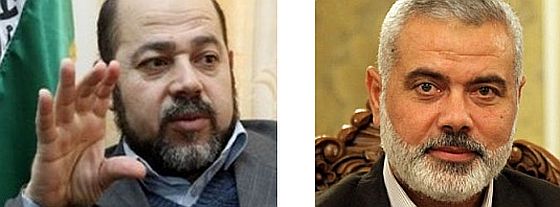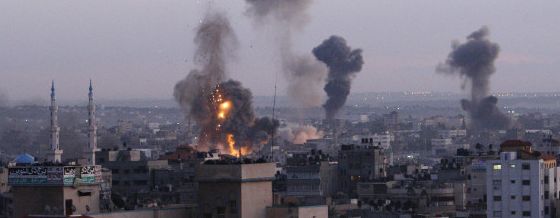
Musa Abu Marzook and Ismail Haniyeh - both contending to become leader of Hamas.
Hussein Ibish writes: The internal dynamic of Hamas has traditionally been that leaders in its Politburo, which is based almost entirely in neighboring Arab countries, were more militant than their compatriots inside Gaza. It was the leaders in exile who maintained close relations with the radical regimes in Iran and Syria, while the Hamas government in Gaza was more restrained because it had more to lose from violence with Israel.
That calculation has been inverted in recent months as Hamas’s foreign alliances have undergone a dramatic transformation and its domestic wing has made a bold attempt to assert its primacy. Hamas’s relationship with Damascus completely collapsed when the group came out in opposition to President Bashar al-Assad’s regime. The Politburo had to abandon its Damascus headquarters, and is now scattered in capitals throughout the Arab world. This has also created enormous strains with Iran, which is apparently supplying much less funding and material to Hamas than before.
Hamas leaders in Gaza, meanwhile, have increasingly been making the case that the Politburo does not represent the organization’s paramount leadership — but rather its diplomatic wing, whose main role is to secure aid and support from foreign governments. It is the Hamas government and paramilitary force in Gaza, they argue, that are in the driver’s seat, because they are actually involved in fighting Israel.
The desire to be the tip of the spear against Israel explains why Hamas involved itself in rocket attacks against Israel earlier this year, and has done much less to prevent other groups from launching attacks in recent weeks. The attacks are part of the case for the transfer of paramount leadership away from the exiles and to the Hamas political and military leadership in Gaza, which portrays itself as doing the ruling and the fighting.
This internal struggle has been given renewed urgency by the September announcement from the group’s current head, Khaled Meshaal, that he would step down. The two contenders for the top spot are Hamas’s de facto leader in Gaza, Ismail Haniyeh, and the present Politburo number two, the Cairo-based Musa Abu Marzook. A Haniyeh victory would cement the transfer of power within Hamas to Gaza, while Abu Marzook represents continued hopes that Hamas’s fortunes hinge on benefiting from the region-wide “Islamic Awakening” — the group’s interpretation of what others call the Arab Spring.
These rocket attacks don’t just come at a time of intense internal wrangling within Hamas, but also Israel’s upcoming election in January. Prime Minister Benjamin Netanyahu and his government have been under enormous pressure to forcefully respond to the continued rocket fire — more than 800 rockets so far this year, according to Israeli officials — and Jaabari’s assassination sends the most powerful of messages. Netanyahu has made his political career on security issues, but even if he hopes to limit the conflagration, it could spiral out of everyone’s control.
The third vital context for Wednesday’s offensive is the upcoming initiative by the Palestine Liberation Organization to formally request an upgrade at the U.N. General Assembly to “non-member observer state status.” Israel is vehemently opposed to this resolution, which is certain to win a majority if it is submitted. Jerusalem has reacted with a series of dire threats — including cutting off the tax revenues it collects on behalf of the Palestinian Authority, declaring the Oslo Agreements “null and void,” overthrowing Palestinian President Mahmoud Abbas, greatly expanding settlement activity, or even unilaterally annexing parts of the occupied West Bank.
Israel has also been marshaling U.S. and European opposition to the PLO’s statehood bid, apparently with a great deal of success. Together, they have been able to paint the move as “unilateral” and provocative, setting the stage for retaliatory measures. But the Israelis must be aware that any further financial, diplomatic, or political blows to the badly ailing Palestinian Authority — which is currently unable to meet the public employee payroll, on which the majority of Palestinians in both the West Bank and Gaza depend — can only strengthen Hamas.
During last year’s PLO initiative at the United Nations, Hamas was in such disarray from its growing crisis with Syria and Iran that it was in no condition to exploit Israeli “punishment” of the PLO. This time, however, Hamas is in an entirely different position: It appears to be on the brink of achieving considerable regional and international legitimacy. The emir of Qatar recently visited Gaza, becoming the first head of state to do so, and promised $400 million in reconstruction aid to the de facto Hamas government there. Turkish Prime Minister Recep Tayyip Erdogan is also reportedly considering a formal visit to Gaza. Egypt, too, is vying for Hamas’s affections, although President Mohammed Morsy’s government has done little to practically help the group.
Hamas can claim, for the first time in many years, to have a vision for the future, reliable patrons, and regional momentum as the primary beneficiaries of a wave of Islamist political victories across the Middle East. The PLO, Hamas can argue, has no money, no friends, no vision, and no future. [Continue reading…]


